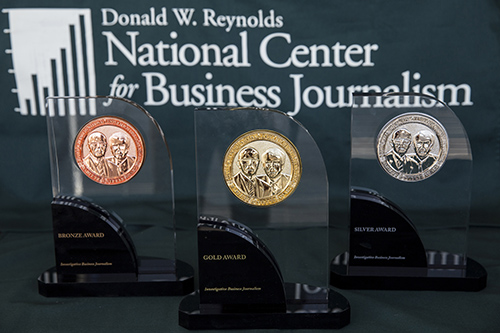Kaiser Health News and an investigative team of the International Consortium of Investigative Journalists (ICIJ), NBC News and The Associated Press won the top awards in the 13th annual Barlett & Steele Awards for Investigative Journalism, the Donald W. Reynolds National Center for Business Journalism announced today.
The Wall Street Journal won the silver award and The Oregonian won the bronze award in the annual Reynolds Center honors, which celebrate the best in investigative journalism. The awards are named for the renowned investigative team of Don Barlett and Jim Steele, whose honors included two Pulitzer prizes.
GOLD:
Two separate entries received the gold award for coverage of the Food and Drug Administration’s granting of secret reporting exemptions to medical device makers in order to keep millions of malfunction and injury reports out of the public eye.
In the Kaiser Health News “Hidden Harm” series, reporter Christina Jewett revealed existence of the exemptions and examples of malfunction, triggering an FDA response. In the “Implant Files” series, investigative teams of the ICIJ, the NBC News Investigative Unit and the AP worked exhaustively to gain global regulatory information, track steps of regulatory response to the problem and dramatize patient safety consequences across mediums and across borders.
Among the many medical devices in the FDA secret database were 500,000 reports of injuries or malfunctions tied to breast implants; 66,000 surgical stapler malfunctions; and more than 50,000 deadly incidents tied to a device implanted in the heart to shock a patient back to life. Persistence by the journalists led the FDA to announce the largest modernization of its reporting system in a generation, and similar responses followed suit around the globe.
“The coverage of this issue made expert use of data reporting about a huge and growing aspect of health care,” said the judges. “The numbers affected are astounding and worldwide in significance.”
SILVER:
The Wall Street Journal staff – in particular reporters Russell Gold, Katherine Blunt and Rebecca Smith – received the silver award for explaining how PG&E Corp., the nation’s largest utility, left hundreds of thousands of people vulnerable to wildfires sparked by equipment that already has caused the deaths of 85 people. The reporting on PG&E’s failures was spawned by the Camp Fire wildfire that tore through Paradise, California, reducing the town with a population of 26,000 to ash. Using a little-known state database of fires started by PG&E equipment, a Journal analysis showed the utility’s equipment had started more than one fire a day in recent years.
Three hours after the article was published, PG&E’s CEO stepped down and the next day the company announced it would seek bankruptcy protection. The Journal then focused on what started the Camp Fire: a century-old high-voltage transmission line on which maintenance work had been postponed for more than five years. The Journal found that hundreds of miles of transmission lines had exceeded their useful lives and were a danger.
“Relentless ongoing coverage, getting inside the company and even obtaining its email messages resulted in a news story of a disaster expanding into a much broader issue,” said the judges.
BRONZE:
The “Polluted by Money” series in The Oregonian by reporter Rob Davis received the bronze award. The series reported that corporate cash had corrupted environmental goals of one of America’s greenest states. Davis spent 18 months examining how and why Oregon has fallen behind a number of other states on environmental fronts and came up with this reason: Its failure to regulate campaign cash has made it one of the biggest money states in American politics. Company and industry groups contributed $43 million to winning candidates in elections from 2008 to 2016, which was nearly half the money regulators raised and far ahead of organized labor, single-issue groups and individual donors.
The series noted that powerful industries have killed, weakened or stalled efforts to deal with many environmental issues. Coverage involved hundreds of interviews and thousands of pages of public records to document how unlimited contributions affected decision-making. Four months after the series launched, Oregon lawmakers enacted the state’s first campaign finance restrictions in decades.
“This is excellent state reporting that goes against Oregon’s green image by contending policies are bought and paid for by energy companies,” said the judges.
“The dedicated business journalists receiving this year’s awards were energized by dynamic trends in implanted medical devices, increased reliance on electricity and campaign contributions affecting environmental decisions,” said Andrew Leckey, president of the Reynolds Center. “Our awards continue to reflect business investigations spawned by curiosity and a refusal to accept anything at mere face value.”
The judges for this year’s awards were Cesca Antonelli, editor in chief of Bloomberg BNA, Paul Steiger, executive chairman of ProPublica, and Dan Hertzberg, longtime financial journalist with The Wall Street Journal and Bloomberg News. Judges recused themselves from deliberations involving their current news organizations.
The awards will be conferred on Monday, Nov. 25, 2019, at the Walter Cronkite School of Journalism and Mass Communication at Arizona State University in Phoenix.










